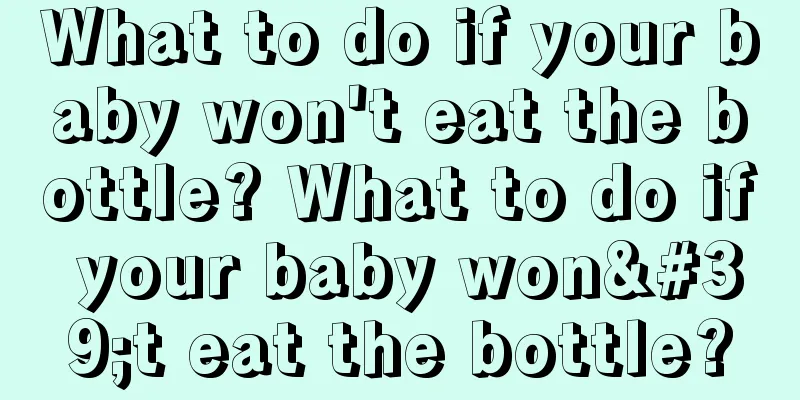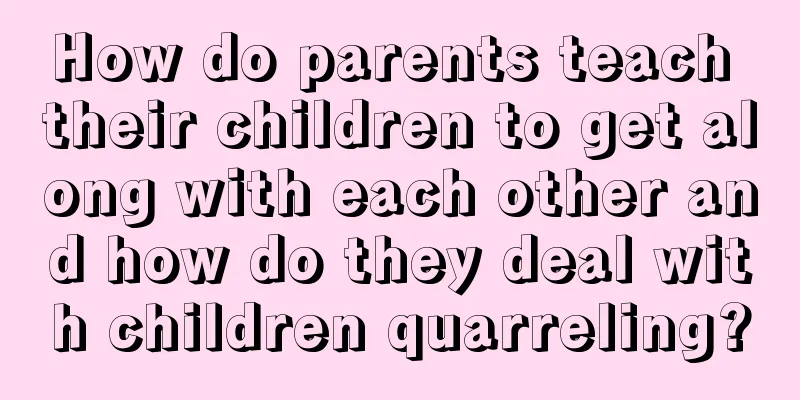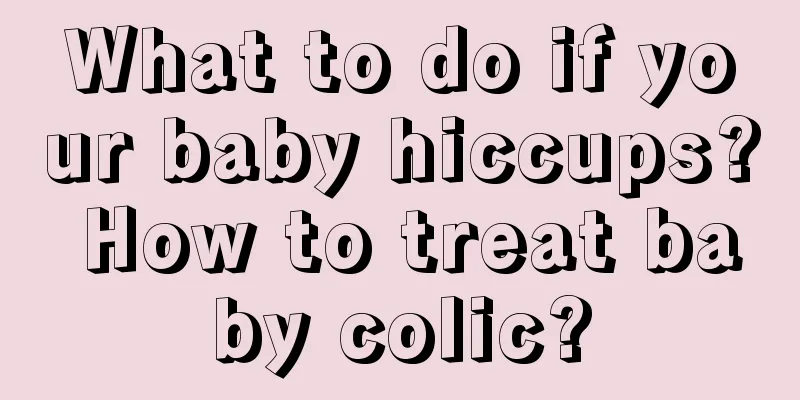What to do if your baby won't eat the bottle? What to do if your baby won't eat the bottle?

|
Many mothers who have been breastfeeding for a long time will find that their babies are not used to using bottles. What should we do when this happens? Here are some good ways to stop babies from eating bottles. Solutions for babies who don't want to drink bottle1. Choose a simulated silicone pacifier. It is better to prepare several and find the pacifier that is closest to the mother's nipple for the baby; 2. You can squeeze breast milk into a bottle and try to let your baby drink it; 3. When feeding water or milk powder with a bottle, add some glucose appropriately to increase the sweetness and arouse the baby's desire to suck. 4. Do not put the bottle mouth into the baby's mouth. Instead, place the bottle mouth next to it and let the baby find the bottle mouth by himself and put it in his mouth actively. 5. Try feeding your baby in different positions. Some babies like the person feeding them to raise their feet when they are fed with a bottle; some do not like to look at the babysitter's face and prefer to suck the bottle with their back facing the babysitter's chest. 6. Try to hug him, rock him, take a walk, etc. to calm him down. 7. When your baby falls asleep, put the bottle in his mouth. 8. The temperature of milk should be appropriate. If the baby is accidentally scalded, he will develop a fear of breastfeeding, and it will be difficult for him to accept a bottle in the future. 9. Make preparations before feeding your baby. Help him/her urinate first. Don’t feed him/her for a while and then do other things. If you keep doing this, your baby will not be in the mood to feed. 10. Add complementary foods in time: At 2 months, the baby can drink fruit juice. At 4 months, he can eat complementary foods such as rice noodles, egg yolks, liver meal, fish meal, and fruit puree, and then gradually to vegetable and meat porridge, soft noodles, etc. After being able to eat complementary foods, things will be much better, at least he can absorb nutrition from other aspects. 11. Eat and drink in front of her: At a certain stage, the baby will be very curious about the outside world. When she sees what you are eating, she will be very greedy and want to try it. 12. Divide the baby's feeding time into three periods: morning, noon and evening. Try it in the middle period first, when the baby is more likely to accept new things. You can use the bottle to tease him first, then feed him a few mouthfuls to make him familiar with the bottle. Then feed him more often with the bottle when he is emotionally stable. Analysis of the reasons why babies don't drink bottles1. Breastfed babies don’t like pacifiers. This is the most common reason, and most breastfed babies will encounter this problem. While we are content to feed our babies, we often don’t expect that it is so difficult for them to accept pacifiers. 2. Don’t like the taste of milk powder. Although the baby is small, he has his own ideas and tastes. He may not like the taste of this milk powder. 3. Milk aversion period. At about 4 months old, the baby gradually matures. On the one hand, he may have added complementary food and prefer new flavors of food, and temporarily lose interest in milk powder. Some experts say that at 4-6 months old, the lactose enzyme in the baby's body begins to decrease, the taste of the tongue begins to change, and the appetite begins to change. On the other hand, his hearing and vision have made breakthrough progress, making him more interested in the outside world. He often "meddles in other people's business" at the slightest sign of trouble, and his mind is no longer on feeding. 4. Wrong feeding method. Because the angle of the bottle is not right, it presses the tongue and prevents the baby from drinking milk. It is best to gently put the bottle into the baby's mouth at a 45-degree angle. The mothers here are all experts and will not do this. 5. If the baby has oral or other diseases, occasionally does not eat milk powder for a long time, or cries, is listless, etc., there may be physical problems. Solutions for babies who refuse to take bottlesOnce some babies are used to breastfeeding, they will resolutely refuse to be fed with a bottle and lose the ability to suck on a pacifier. So, under what circumstances, how should we solve the problem of babies refusing to eat bottles? Parenting experts point out that babies who refuse to drink milk bottles usually have unique psychological characteristics. Some of these babies are sensitive to external stimuli due to low sensory thresholds; some are slow to accept new things due to weak adaptability; and some react strongly to external stimuli and show strong dissatisfaction at the slightest discomfort. Therefore, if the baby refuses to drink milk bottles because of resistance to new things, parents need to be more patient and loving to the baby, slowly cultivate the baby's ability to accept new things, and take corresponding measures according to the child's personality characteristics. For example, you can put some cute cartoon patterns on the milk bottle to make the baby interested in and like the milk bottle, and the baby will naturally be willing to use the bottle. If the baby suffers from "bottle phobia" because of discomfort with the pacifier, the mother can buy several types of pacifiers to see which one the baby likes. Although the feeling of the best pacifier is still different from breastfeeding, you can choose a pacifier that is close to the real feeling of breast milk. At the same time, the softness of the pacifier is also very important. In addition, if the baby refuses to use the bottle because the bottle is uncomfortable, the mother can change the bottle, such as a lighter bottle with a handle that is easier for the baby to hold. What mothers need to note is that getting a baby to accept a bottle is not something that happens overnight, but rather a gradual process. Here, the editor does not agree with using hunger or force to get the baby to accept a bottle, as these will have an adverse effect on the baby's psychological growth. To correctly solve the problem of baby refusing to take a bottle, mothers need to choose the right bottle and nipple, and at the same time use the greatest confidence and patience to accompany the baby through this "most special experience" in the baby's life. |
<<: Premature infant care points Premature infant care points
>>: How to change diapers How to use diapers
Recommend
How to choose a baby stroller? What are the good brands of baby strollers?
There is one thing that every family with a baby ...
What should I do if I have a high fever during breastfeeding? Can I breastfeed if I have a cold and cough?
When mothers are breastfeeding their babies after...
How to take care of your skin during confinement? Postpartum skin care is very important to avoid being a yellow-faced woman
Many mothers who have just given birth are confus...
How to wean your baby? Five things to note when weaning your baby
When the baby grows to a certain stage, it is nec...
Is Blue Moon laundry detergent good for washing underwear? Can Blue Moon laundry detergent sterilize underwear?
When I use Blue Moon to wash clothes, I find that...
What are the benefits of eating mutton for pregnant women?
Lamb is a food that many people like to eat. Stew...
Are breastfeeding and bottle-feeding nutritionally equivalent? Will breastfeeding and bottle-feeding make you lose weight?
Whether to breastfeed or bottle-feed your baby is...
How can parents strengthen parent-child bonding during holidays?
In the process of growing up, sufficient interact...
What are the precautions for couples to prepare for a second child?
The comprehensive relaxation of the two-child pol...
Does Liushen Floral Water contain alcohol? Is Liushen Floral Water suitable for any skin type?
I heard that there is some alcohol in toilet wate...
How should infants and young children supplement iron?
Calcium, iron, zinc, selenium and vitamins are es...
How to distinguish the authenticity of super laundry detergent? The advantages of super laundry detergent
Soon after Super Power Laundry Detergent was laun...
What are the symptoms of excessive amniotic fluid in pregnant women? Mothers should pay attention to
When the baby is in the mother's belly, it li...
What should I do if my baby likes to scribble at home?
Babies like to scribble on the walls everywhere, ...
What should you pay attention to when preparing for pregnancy on snowy days?
The light snow season has just passed, and many c...









